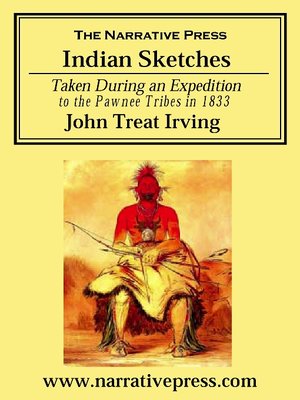Indian Sketches
ebook ∣ Taken During an Expedition to the Pawnee Tribes in 1833
By John Treat Irving, Jr.

Sign up to save your library
With an OverDrive account, you can save your favorite libraries for at-a-glance information about availability. Find out more about OverDrive accounts.
Find this title in Libby, the library reading app by OverDrive.



Search for a digital library with this title
Title found at these libraries:
| Library Name | Distance |
|---|---|
| Loading... |
In 1833 John Treat Irving, Jr., only 20 years old, set off west in the footsteps of his famous uncle, Washington Irving. Indian Sketches chronicles his experiences traversing the prairie and living among the Pawnees, Otoes, and other tribes.
Looking at everything with fresh eyes, Irving's sketches of the people and customs he encountered avoid the common stereotypes of Indians. There is a tragically amusing scene of his first encounter with an Indian on that man's native land. The Shawnee stands heroic and tall in the distance, and Irving fancies him "as noble as the soil of which he was the master." However, the closer the party gets, the more bedraggled and wretched the man looks, and Irving's fantasies are shattered.
Irving recovers from his disappointment with all the buoyancy of any 20-year-old, and the rest of the book is dedicated to incredibly realistic and literary portraits of people. The language is always vivid, and Irving gets the same thrill out of watching a dramatic battle scene as he does from describing the mischievous antics of the three toothless old women who torture his party's cook. Early in the book he describes the "welcome" he and his party receive from one tribe:
"Suddenly, the Iotan galloped a few yards in front, and waved his arm, uttering a long, shrill yell. It was answered by a loud whoop from those on the hill; who instantly commenced whirling their blankets around their heads. Then all was silent. For a few moments we were in doubt as to the meaning of the manoeuvre; but suddenly a loud roar rose from behind the bluff, and a dark troop of wild horsemen burst round its base, and came pouring down upon us. There must have been several hundred of them. Every man was naked, but glaring with paint. They flooded onward, pealing out scream upon scream, brandishing their spears, and whirling their tomahawks around their heads...I looked around upon our little band, there were several lowering brows and tightly compressed lips, and the fingers of two or three were on their gun triggers."
Equally intense are Irving's descriptions of the prairie itself, dramatized in this passage about a prairie fire he witnessed:
"Another gust came rushing along the ravine. It was announced by a distant moan; as it came nearer a cloud of dry leaves filled the air; the slender shrubs and saplings bent like weeds - dry branches snapped and crackled. The lofty forest trees writhed, and creaked, and groaned. The next instant the furious blast reached the flaming prairie. Myriads and myriads of bright embers were flung wildly up in the air: flakes of blazing grass, whirled like meteors through the sky. The flame spread into a vast sheet, that swept over the prairie, bending forward, illuminating the black waste which it had passed..."
Irving's enthusiastic narrative includes in-depth pictures of domestic life in villages, reports of the Pawnees sacrificing young women to the Morning Star, and dramatic retellings of ancient legends. Indian Sketches is a real adventure story, told in electrifying detail.







